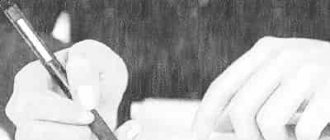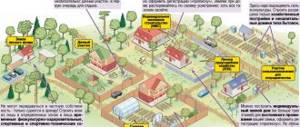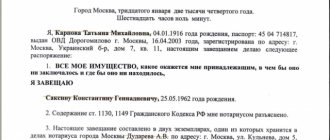What is a will for inheritance of property?
After the death of a person, the distribution of his property among his heirs occurs in accordance with the norms of civil law.
If there are no heirs, then ownership of the property passes to the state.
According to paragraph 5 of Art. 1118 of the Civil Code of the Russian Federation, a will is a unilateral transaction that creates rights and obligations for the recipients of the inheritance after its opening.
In order to distribute the inheritance between close people at his own discretion, during his lifetime a person must leave a documentary order in this regard, which, due to its legal nature, is the basis for the legal transfer of property.
A will is a citizen’s last lifetime order on how property will be divided among heirs.
Advantages and disadvantages
The advantages of bequeathing property, compared to donating it, are much greater than the disadvantages .
- Testamentary instructions in the event of death can be edited or canceled in the future. When donating property, such actions are not permitted by law.
- When making a will, you can leave instructions regarding the property that the testator will have in the future.
When registering a gift of gift, the legislator does not provide for such an opportunity. - The heirs will receive ownership rights to the property under a testamentary disposition only after the death of the testator. Under a gift agreement, the donor is immediately deprived of these rights.
The disadvantages include:
- the document is easy to challenge in court.
In practice, invalidation of a will occurs quite often. While it is almost impossible to challenge a deed of gift. - There is a certain category of people to whom the obligatory part of the inheritance is distributed according to the law, regardless of the wishes of the testator:
- young children;
- elderly parents;
- incapacitated people who are dependent on the testator.
In any case, the person who executed the will, by all indications, remains the winner, because the ownership rights to the property remain with him until his death.
You can find more information about the pros and cons of wills and deeds of gift, as well as the differences between them, here.
For whose benefit can the testator transfer property?
The legislator reserves the right of the testator to independently choose an heir; here the principle of freedom is not limited in any way.
You can bequeath your fortune to any person, regardless of the degree of relationship. Any property or real estate can be a bequeathed inheritance. Also, the testator may bequeath to the heirs the fulfillment of his lifetime obligations or the performance of any action of a certain nature, for example the payment of rent, such a will will be encumbered. And the duty of the heirs is to fulfill the assignment.
Is it possible to create for one, several heirs or a legal entity?
The testator has the full legal right to leave his entire estate to one person or to distribute the inheritance in any parts among several people, regardless of the degree of relationship. Also, the right to dispose of inheritance can be left to a legal entity.
Attention! The appointment of heirs is established in accordance with the provisions of civil law.
The testator can bequeath property:
- any people, regardless of nationality, religion, citizenship and degree of relationship with the testator;
- educational and other institutions;
- Russian and any other state;
- legal entities, including international and foreign organizations;
- any locality or district.
Rights and obligations of the testator
The law gives the testator certain rights. A person who leaves a directive in the event of his own death has the legal right to:
do not disclose the contents of the will to anyone;- not notify the heirs about the execution, cancellation or editing of testamentary instructions;
- leave any family member without inheritance without specifying the reason;
- bequeath property to one person or several people, regardless of family ties;
- distribute parts of the property among the heirs in any way;
- bequeath absolutely any personal property;
- leave dispositions regarding property that may arise in the future.
Important! The only limitation is the fact that the testator is obligated by law to include in the will a certain group of people who, according to the provisions of Civil Law, have an obligatory share in the inheritance.
Testamentary refusal or assignment - what is it?
Testamentary refusal and testamentary assignment are relatively similar legal concepts.
A testamentary disclaimer is an instruction left by the deceased for the heirs regarding the fulfillment of a specific obligation of a property nature at the expense of the bequeathed inheritance.
A testamentary assignment is an order of the testator to impose certain obligations on the recipients of the inheritance or on the executor to perform certain actions.
Who is an executor?
An executor is any person appointed to carry out the orders of the testator, regardless of the degree of relationship with the testator and interest in the inheritance.
Article 1134 of the Civil Code of the Russian Federation defines that the testator can entrust the execution of his last instructions to a certain person .
The executor of a testamentary order must give his consent to fulfill the obligations. Appointing an executor of a testator's last will carries with it serious legal and moral responsibility.
Secret of the will
Keeping information about a will confidential is important.
After all, the testator has the legal right not to tell anyone about making documentary orders in the event of death. All persons present during the preparation of the testamentary document are obliged to keep the last will of the testator secret. Attention! Article 1123 of the civil law, dedicated to the secrecy of a will, regulates that no one has the right to disclose any information about the document before its opening or cancellation.
More details about the procedure for certifying a will, as well as who, besides a notary, can certify the document, are discussed in a separate article.
What to bequeath
The testator has the right to bequeath all of his property, including those acquired in the future, or only part of it. He can also distribute the inheritance among successors in any shares and in any order, based solely on personal considerations.
The inheritance can be:
- movable and immovable property;
- land plot;
- stock;
- bank deposits;
- valuables;
- sums of money not paid to the testator during his lifetime;
- enterprise or farm.
Separately, the purpose of testamentary refusal and assignment should be mentioned. In accordance with Articles 1137 and 1139 of the Civil Code, the testator has the opportunity to order that specified persons receive certain material benefits and services from the testator.
The subject of a testamentary refusal is property obligations carried out at the expense of the received inheritance:
- provision of the specified thing for use;
- periodic payment of established amounts of money;
- performing specific work;
- transfer of ownership of one or more objects of inheritance;
- acquisition of certain property for the legatee.
A testamentary assignment may be assigned to the implementation of some generally useful purpose, not necessarily of a property nature, for example, caring for a pet.
The testator has the right to order the appointment of an executor of the will, assigning to him the responsibilities of transferring property to the heirs and monitoring the implementation of the testamentary refusal or assignment.
We arrange it correctly
How the disposition of the property is drawn up, whether it is printed or written by hand, is not of fundamental importance. The main condition is that the will must be drawn up correctly - in the presence of an authorized person and certified by the personal signature of the testator. It happens that due to limited capabilities, a person is not able to sign a will on his own.
In such a situation, the testator may ask any other person who is not interested in receiving the inheritance to sign instead of him. Such a signature will be equated to the signature of the testator, but information about the person who signed the document (signer), as well as the reasons why the testator could not sign with his own hand, must be recorded in the will. The document must also indicate the place and date of execution of the will.
Important! According to the provisions of civil law, a person, leaving instructions regarding the distribution of property, can write a closed will. Only the testator himself will know the text of the document.
A person writes a closed will independently with his own hand and certifies it with his own signature. Then, in the presence of two disinterested people (witnesses), the testamentary disposition is handed over to the notary in a closed and sealed envelope.
The envelope must have the signatures of witnesses. The employee of the notary office seals the envelope with the testamentary document in another, on which he puts an authentication stamp and indicates the information required by law:
- information about witnesses and testator, in accordance with passports;
- place and date of making the disposition in case of death.
You can read about open and closed wills, as well as types of dispositions, here.
Peculiarities
In an emergency situation (war, threat to life, etc.), a death order can be drawn up without notarization in the presence of 2 witnesses. When the emergency situation ends, if the testator is still alive, such a document must be certified by a notary within 1 month.
Read more about whether it is possible to draw up a document without the help of a specialist and what documents are needed to register a will with a notary here.
How many wills can a citizen make?
Therefore, the notary must make sure that the testator understands the meaning of his actions, guides them, is not mistaken regarding what he has prepared, and is not threatened or deceived by anyone.
The will must be drawn up in writing, indicating the place and time of its preparation and signed personally by the testator in the presence of a notary. If the testator, due to physical disabilities, illness or illiteracy, cannot sign the will with his own hand, it, at his request, can be signed in the presence of a notary or other person certifying the will, by another citizen, indicating the reasons why the testator could not sign the will in person. In accordance with Part.
The execution of a will by a notary by two or more persons is not permitted, since the document can contain the orders of only one citizen. Rights and obligations arise only after the opening of the inheritance, that is, after the death of the testator.
We recommend reading: State duty for establishing paternity
The number of wills made by one citizen is not limited by law.
A citizen has the right to dispose of part of his property, or all of his property, by registering one or more wills with a notary.
Certification by a notary
To make a will, you need to come in person to any notary organization. The document does not have to be drawn up by hand; you can use the help of technical means. The main condition is the personal signature of the testator and certification by a notary, who establishes the identity, voluntary desire and legal capacity of the testator.
Documentation
When visiting a notary's office, you must have your passport with you. Some notaries require documents for bequeathed property.
The list of mandatory and additional papers for drawing up a will is presented in this article.
Witnesses
At the request of the testator, witnesses who are not interested in inheritance rights can be invited to the registration procedure.
Is it possible to act through a representative?
One person cannot transfer the responsibility for making a testamentary document to another. The testator must appear at the notary's office in person or call a notary's employee to your home.
Important! Current civil legislation establishes the rule for drawing up a will by one person personally. Making a testamentary disposition on the behalf of another person is illegal and unacceptable. A document drawn up in this way has no legal force and is considered invalid.
What is the price?
The cost of preparing a formal disposition of property in the event of death includes the official certification of the document and the work of a professional.
- Legal certification of a will - 100 rubles.
- Drawing up one page of document text by a specialist costs 1000-1200 rubles (the cost depends on the notary office).
Certification of a testamentary disposition regarding property occurs in the following general procedure.
- An employee of a notary office establishes the identity of the testator in accordance with the passport, legal capacity and voluntary desire.
- The notary determines the last will of the testator.
- The authorized person explains to the testator his rights and obligations.
- The person drawing up the testamentary disposition certifies it with his own signature;
- The notary seals the document in an envelope and makes an inscription on it as required by law, containing the date and place of its execution.
If for some force majeure reason the original document is lost, you can get a duplicate.
Types of wills
The law provides for several types of wills. Their legal force is not always equivalent, but each of them is adapted to certain circumstances and can be chosen by the testator at will, albeit with some reservations.
Open notarized
It can also be called universal and the definition of openness here is relative. The document is available for reading by the notary, witnesses and executor, but no more, if such is the desire of the testator. All participants in the process of certification of the act are required to keep its contents secret. Otherwise, they may be required to pay monetary compensation for moral damage caused in this way.
Such a will, if the mandatory requirements for its preparation are met, is a reliable way to dispose of property in the event of death. Its legal significance is guaranteed by Articles 62 of Chapter 62 of the Civil Code of the Russian Federation and can be challenged in exceptional cases.
Using an open notarized document, you can bequeath property of all types (except those prohibited by law) if you have access to any valid notary in the country or the persons indicated in the last paragraph of the “Where to contact” block.
Closed
This is a type of act of expression of will described above, with the only difference being the nuances of execution and the complete confidentiality of the information contained in it.
If the testator wishes to hide his posthumous dispositions from others until the opening of the inheritance and has doubts about the secrecy of the will by the notary and other participants in the execution, he should draw up a document in a closed form.
If the procedure for making a closed will is strictly followed, the testator’s orders will be learned only after his death. The document itself, hidden in two sealed envelopes, is kept by the notary who compiled it. The testator does not have his own copy - after the registration procedure, he is given only a document confirming the action performed.
Testamentary disposition
This type of act of expression of will has the same force as a will only in relation to bank deposits. No other property can be transferred with its help.
The rules for drawing up a testamentary disposition are similar to a standard will, but are made according to a simplified scheme and without the presence of a notary. The necessary actions for certification and registration of the document are carried out by an authorized bank employee.
By means of a testamentary disposition, the owner of a cash deposit can appoint one or several heirs and assign others to them (in case the priority successors do not accept the inheritance). The object of succession for them can be all the testator’s cash accounts in a particular bank, one or more of them, or part of one deposit. In this case, the testator has the right to set conditions for the heir to receive money, for example, that he reaches a certain age, etc.
In emergency situations
In conditions that threaten the life of the testator, he has the right to express his last will in simple written form, without certification by a notary or other authorized persons. But certain requirements for drawing up and entering into inheritance under such a will still exist:
- The testator must personally state and sign the deed. The signature of the executor or the writing of instructions by other persons from the words of the testator (as in the case of notarial registration) is not allowed.
- The expression of will must take place in the presence of at least two witnesses who, if necessary, will hand over the paper to the heirs and confirm the authenticity of the will and the fact of an emergency.
- The will expressed by a citizen in emergency circumstances is recognized only in the event of his death within a month after the making of the will. After this period, the document is canceled, but its essence can be secured through a notarized deed.
- Heirs can enter into an inheritance under a will written in emergency circumstances only through the court, after its legality has been established.
How to correctly draw up a will during your lifetime (sample)
Before you start drawing up your last statement of will, you need to familiarize yourself with the rules of writing:
- The will must be made by an individual. If the testator, for good reasons, is not able to display the contents of the act on his own, a notary does this from his words, after which he must pass it on to the testator for reading or read it himself (also for good reasons).
- The signature of the will-maker is an integral part of the legal force of the document. If the testator is unable to do this, another citizen signs the act for him, but in the presence of an authorized body.
- The deviations from the rules described above must be noted by the notary on the will, indicating the reasons that led to them.
- It is important to note the date and place where the will was made - without this, the document becomes invalid (does not apply to a closed will).
- When drawing up a closed will or writing a declaration of will in emergency circumstances, the presence of two witnesses is required.
- A will not certified by a notary must contain the signature of one witness.
- It is mandatory to indicate the names and contact information of witnesses or the person who signed the document instead of the testator, on the will itself or on the envelope with it.
Procedure for compilation
When making a will at a notary, the contents of the act are written by hand or using technical means (typed on a computer and printed) personally by the testator or from his words. Then the document form is certified by the authorized body and, if necessary, signed by witnesses. Standard execution requires drawing up a will in two copies, one of which is given to the testator, and the other remains with the notary.
If the will was made in closed form, all the necessary signatures, seals and notes are placed on the envelope in which the written instructions of the testator are sealed. The envelope remains with the notary until the inheritance is opened, and the testator is given a paper confirming the acceptance of the closed document.
In Art. 1129 of the Civil Code of the Russian Federation prescribes the procedure for presenting the testator’s orders in emergency circumstances. The process involves the transfer of one's will in a simple form, but with the obligatory presence of two witnesses who signed the paper along with the testator. Such a document will have incomplete legal force, and you can only receive an inheritance through it through the court.
How to find out about a will and receive an inheritance?
If the testator has not notified the heirs about the will, it is quite problematic to look at the contents of the document or find out about the inheritance left.
It is to announce the dying will of the deceased to the descendants that an executor is appointed. The executor of the will must notify interested parties about the availability of orders regarding the inheritance. In 2021, information about all testamentary orders is stored in a special electronic register of the Unified Notary Information System.
Heirs can enter into an inheritance and receive ownership rights to bequeathed property within the period established by the legislator, after 6 months from the date of death of the testator.
The rules for searching for a will in a single database, at a notary and other places can be found here.
Does the heir have the right to sell the property?
If the testator has not written down any instructions in the will regarding the future fate of the property, the heirs can dispose of the received inheritance in any way they wish - refuse it in favor of third parties, exchange it, sell it, donate it.
Attention! After receiving ownership rights to the bequeathed property, the heirs can dispose of it at their own discretion, unless the testator left instructions in this regard.
How to correctly write a will for an apartment (sample)
To draw up a will for an apartment, you must correctly indicate its address; otherwise, the contents of the act do not differ much from the general form of the document. An example of it can be seen below.
wills for an apartment
Change and cancellation
The testator has the right to change the expression of will or completely cancel it. You can do this in two ways:
- By drawing up a separate order to cancel the entire act or its individual paragraphs.
- By writing a new will, when the provisions established in it contradict the previous ones and thereby revoke them.
A will can be adjusted and drawn up an unlimited number of times without specifying the reasons for this, without expecting consent from the heirs determined by the previous act.
It is important to remember that a new act of property disposition cancels the previous one only on the relevant points. The part of the previous will that is not affected by a separate revocation or contrary instructions will remain in force.
A testamentary disposition in a bank is canceled according to a similar principle, however, an application for this can be submitted both to the financial institution itself and to a notary. In the latter case, information about the cancellation must be transmitted to the relevant bank branch.
To cancel a document drawn up under life-threatening circumstances of the testator, nothing needs to be done. Its legal significance will be canceled automatically after 30 days from the date of writing, but only if the author of the act remains alive longer than this period.
Can it be declared invalid?
As judicial practice shows, heirs who are dissatisfied with the distribution of property often go to court with a request to declare the will invalid.
It is possible to challenge a will in cases specified by law.
- The document containing the last lifetime disposition of the testator was drawn up incorrectly.
- Recognition of the testator as incompetent at the time of drawing up the testamentary disposition.
- It is a proven fact that the will was drawn up against the will of the testator through psychological pressure and threats.








